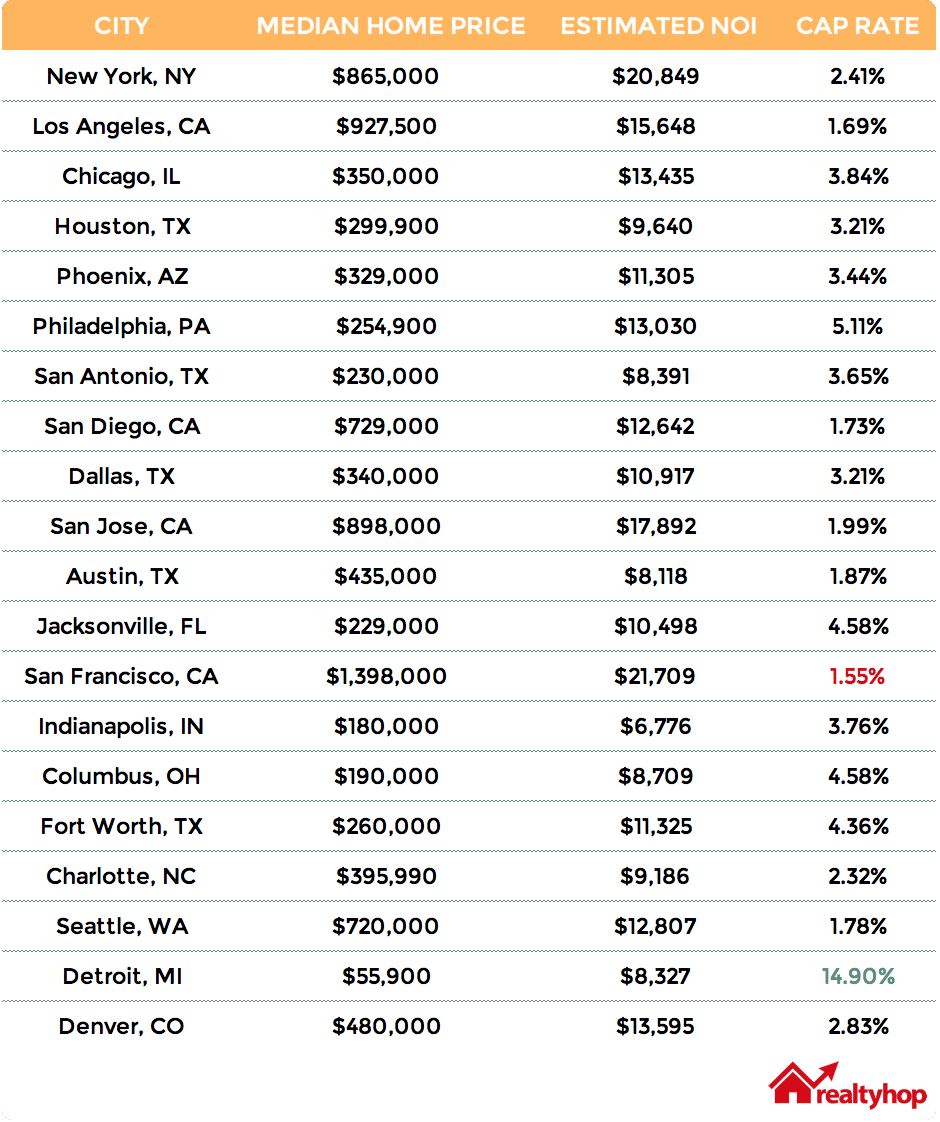
In the below analysis, we break down acquisition price, aggregate yearly rent, operating costs, and the NOI involved in our index calculations. To research capitalization rates and other statistics for specific properties, refer to RealtyHop’s comprehensive homes for sale search that covers every city across the country.
Residential Cap Rates by U.S. City
The below table details capitalization rates across the 20 largest markets by population.

November Real Estate Market Trends
Averages and Statistics
This November, the average capitalization rate across the 100 cities in our index was 3.48%, a decrease from the 3.61% seen in last quarter’s report. Detroit saw the highest cap rate at 14.90%, while Jersey City saw the lowest at 1.40%. The average property tax rate of all 100 cities was 1.14%.

1. Detroit, MI – 14.90%
Detroit had the highest capitalization rate of any city this quarter at 14.90%, an increase from 14.39% last quarter. This jump was due to rent prices remaining steady at a median of $852 per month, while real estate prices dropped to $55,900.
2. Cleveland, OH – 7.13%
Cleveland had the second highest capitalization rate this quarter at 7.13%. The city’s cap rate dropped since our last report, due to an increase in real estate prices from $92,000 this August to $105,000 now.
3. Buffalo, NY – 6.16%
Buffalo increased two spots on our list, despite a slide in its capitalization rate. Real estate in the city had a median of $139,000, alongside rent prices of $1,007 across all listings.
4. New Orleans, Louisiana – 6.11%
New Orleans saw its capitalization rate drop from 7.24% to 6.11% over the past quarter. The decrease was led by strong home prices at a median of $219,900. Average rent across the city was $1,449 per month.
5. Baltimore, Maryland – 5.56%
Baltimore saw the fifth highest capitalization rate at 5.56%, a decrease from 6.42% in last quarterly report. This drop in cap rate was due to a hike in home prices, settling at a median of $199,000.

1. Jersey City, NJ – 1.40%
Jersey City became a less attractive market for investors, as its cap rate dropped to the lowest in the country at 1.40%. While Jersey City did command strong rent prices of $2,256 per month, high real estate prices at a median of $644,900 tempered returns.
2. Fremont, CA – 1.47%
Fremont remained the second lowest city in the country at a 1.47% yield. Median real estate prices over the past quarter were $1.05M, while rent prices were down slightly to $2,800 per month.
3. San Francisco, CA – 1.55%
San Francisco improved from the lowest cap rate last quarter, to now third place at 1.55%. Most of this change was led by a decrease in real estate prices from $1.475M to $1.398M since our last report. Rent prices this November had a median of $3,680, the highest in the country.
4. Los Angeles, CA – 1.69%
Los Angeles saw a decrease in its cap rate over the past quarter, dropping from 1.72% to 1.69%. The change was due to an increase in real estate prices to $927,500, up from $917,500 last report. Rent prices increased to $2,600 per month.
5. San Diego, CA – 1.73%
San Diego had the fifth lowest capitalization rate in the country at 1.73%, a slight increase from 1.71% in our last report. Rent prices had a median of $2,100 per month, while home prices decreased to $729,000.
Methodology
To compile the RealtyHop Property Investment Index, the following statistics were used:
1) Median Household Income: Taken from the U.S. Census ACS
2) Population: By city, taken from the U.S. Census ACS
3) Median Home Price: Drawn from RealtyHop’s database of over 300,000 properties for sale in the month prior to publication
4) Median Yearly Rent: Yearly rental income for the trailing 12 months, drawn from RentHop proprietary data (a RealtyHop affiliated company).
5) Maintenance Costs: Annual maintenance costs for a rental property, equal to 1 percent of the total property price per year
6) Tax Rate/Yearly Taxes: Effective tax rate via U.S. Census data
7) Net Operating Income (NOI): Annual net operating income. Calculated by: Aggregate Yearly Rent – Taxes – Maintenance Costs
8) Capitalization Rate: NOI over Median Home Price
Full Dataset
Limitations
While comprehensive, the RealtyHop Property Investment Index does not take into account occupancy rates and time-on-market statistics. In theory, markets that suffer from net negative migration, and consequently lower rental demand, may see capitalization rates skew higher.
For example, while Detroit has the highest capitalization rate of any city by a large margin, investors there may potentially see lower occupancy rates and longer times on market, thus lowering aggregate yearly rent and NOI. Conversely, popular cities with lower cap rates such as San Francisco, Los Angeles, and New York are likely to see high rental demand, and therefore stronger occupancy statistics
Financial Disclaimer: The numbers provided in the RealtyHop Property Investment Index should be used for informational purposes only. Before making any investment decision, speak with a professional advisor, property manager, or local real estate company to verify the information listed in this report.
